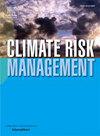韧性作为门户:私人基金会与灾害援助的金融化
IF 5
2区 环境科学与生态学
Q1 ENVIRONMENTAL SCIENCES
引用次数: 0
摘要
国际援助,包括来自私人基金会的捐款,在新自由主义框架内扮演着关键角色,特别是在利用复原力作为适应气候变化加剧的灾难的战略方面。气候灾害的发生频率和强度越来越高,需要创新的应对方式,而非公募基金会处于一个独特的空间,它跨越了公共和私营领域,模糊了两者之间的界限。围绕这些基础的论述与复原力的概念密切相关,复原力将灾难幸存者视为能够催化自身转变的代理人。弹性的概念可能会让我们相信,在面对此类灾难时,在实地工作的非国家行为体是出于赋予个人权力的愿望。考察私人基金会、恢复力和新自由主义体系之间错综复杂的相互作用,可以探索灾害,特别是由气候变化驱动的灾害,如何在新自由主义社会中被视为发展的机会。本研究试图回答这样一个问题:私人基金会对复原力的工具化如何促进灾害援助金融化的发展?为了回答这个问题,我们对两个积极参与救灾的私人基金会从2000年到现在的200份文件进行了话语分析。大约30个半结构化访谈完成了这个分析。本文的理论框架植根于批判性的后结构主义方法,并在当代新自由主义社会中适应性弹性概念的背景下对后人道主义进行了批判性的考察。本文章由计算机程序翻译,如有差异,请以英文原文为准。
Resilience as a Gateway: Private foundations and the financialization of disaster assistance
International aid, including contributions from private foundations, assumes a pivotal role within the neoliberal framework, particularly in its utilization of resilience as a strategy for adapting to disasters exacerbated by climate change. The increasing frequency and intensity of climate-related disasters necessitate innovative responses, and private foundations inhabit a unique space that straddles the realms of the public and private sectors, blurring the lines between them. The discourse surrounding these foundations aligns closely with the concept of resilience, which regards disaster survivors as agents capable of catalyzing their own transformation. The concept of resilience might lead us to believe that non-state actors working on the ground are motivated by a desire to empower individuals in the face of such calamities. Examining the intricate interplay between private foundations, resilience, and the neoliberal system allows for an exploration of how disasters, particularly those driven by climate change, are perceived as opportunities for development within a neoliberal society. This research endeavors to answer the question: How does the instrumentalization of resilience by private foundations contribute to the development of financialization in disaster assistance? To address this inquiry, a discourse analysis of 200 documents from the year 2000 to the present, originating from two private foundations actively involved in disaster assistance, was conducted. Approximately thirty semi-structured interviews complete this analysis. The theoretical framework of this paper is rooted in the critical post-structuralist approach and provides a critical examination of post-humanitarianism within the context of the adaptive conception of resilience within contemporary neoliberal societies.
求助全文
通过发布文献求助,成功后即可免费获取论文全文。
去求助
来源期刊

Climate Risk Management
Earth and Planetary Sciences-Atmospheric Science
CiteScore
8.20
自引率
4.50%
发文量
76
审稿时长
30 weeks
期刊介绍:
Climate Risk Management publishes original scientific contributions, state-of-the-art reviews and reports of practical experience on the use of knowledge and information regarding the consequences of climate variability and climate change in decision and policy making on climate change responses from the near- to long-term.
The concept of climate risk management refers to activities and methods that are used by individuals, organizations, and institutions to facilitate climate-resilient decision-making. Its objective is to promote sustainable development by maximizing the beneficial impacts of climate change responses and minimizing negative impacts across the full spectrum of geographies and sectors that are potentially affected by the changing climate.
 求助内容:
求助内容: 应助结果提醒方式:
应助结果提醒方式:


